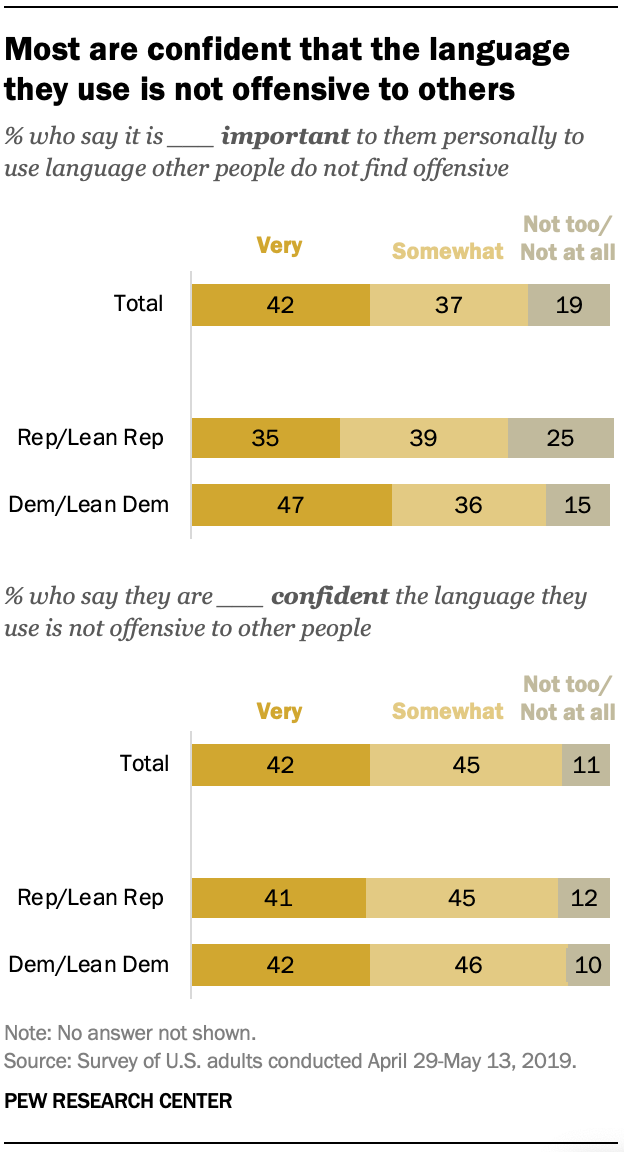 A large share of Americans say it is important to them personally to use language that does not cause offense, and an even larger majority say they are confident that the language they use is not offensive to other people.
A large share of Americans say it is important to them personally to use language that does not cause offense, and an even larger majority say they are confident that the language they use is not offensive to other people.
About eight-in-ten (79%) say it is very (42%) or somewhat (37%) important to them personally to use language that other people do not find offensive. Relatively few (19%) say this is not too or not at all important to them.
Large majorities of both Democrats and Democratic-leaning independents (83%) and Republicans and Republican leaners (74%) say it is very or somewhat important that they do not use language that others find offensive. But Democrats are more likely to say this is very important (47% vs. 35%).
Americans are broadly confident that they do not use offensive language: Nearly nine-in-ten adults say they are very (42%) or somewhat (45%) confident that the language they use is not offensive to other people. Comparable majorities of Republicans and Democrats say they are at least somewhat confident that the language they use is not offensive to other people (87% and 88%, respectively).
There are notable demographic differences when it comes to views on the personal use of offensive language.
Women, older adults and those with a postgraduate degree are especially likely to place high importance on using language that is not offensive to others. Women and older adults also tend to express higher confidence that the language they use is not offensive.
Almost half of women (47%) say it is very important to them personally to not use offensive language. Slightly more than a third of men (36%) say the same. There is a similar gap between the shares of women (46%) and men (37%) who say they are very confident that their own language is not offensive.
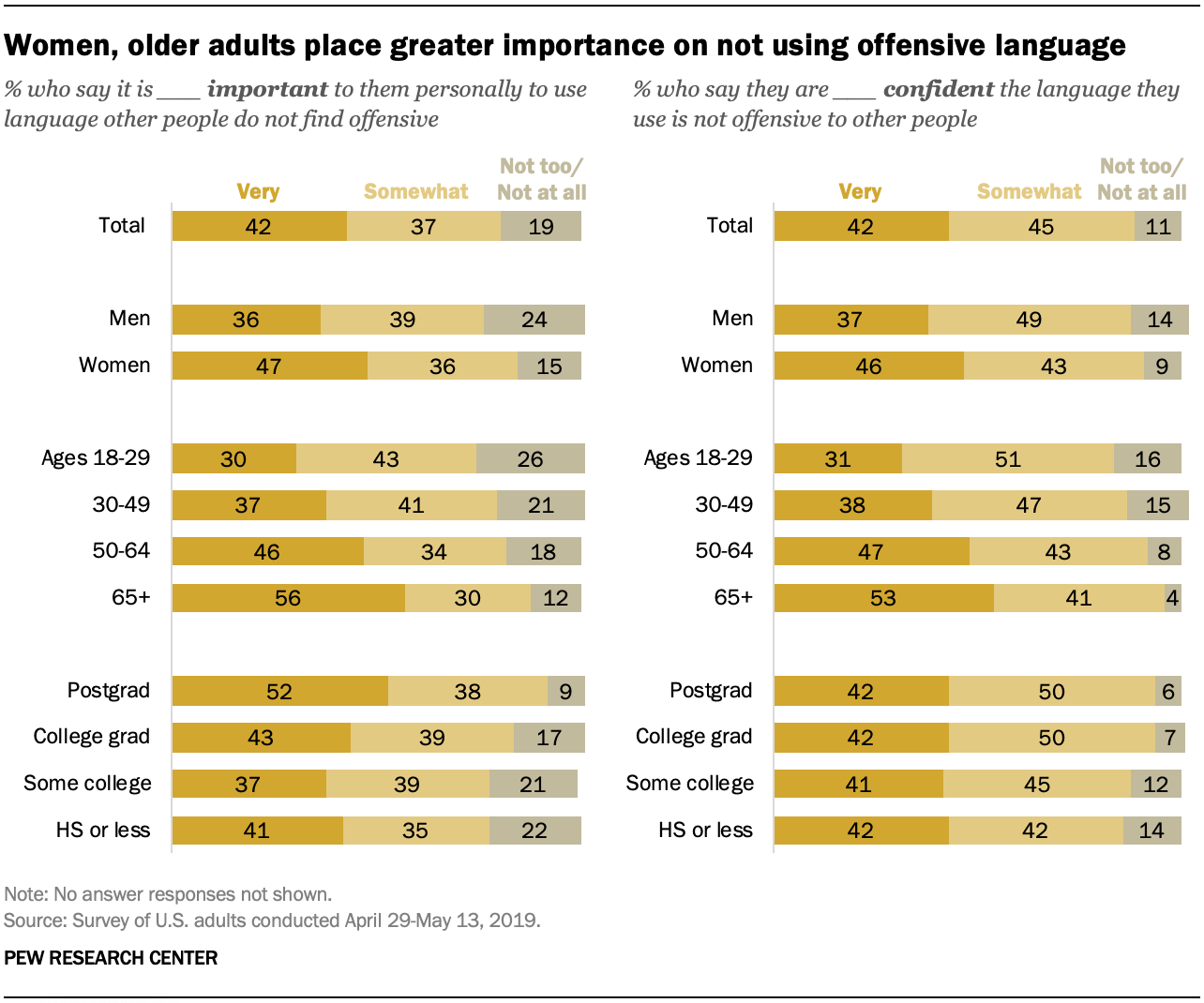 Among those ages 65 and older, 56% say it is very important for them personally to not use offensive language. By contrast, just 30% of those ages 18 to 29 say this is very important to them personally. Older adults also are more confident than younger adults that the language they use is not offensive to others: 53% of those 65 and older and 47% of those 50 to 64 say they are very confident that the language they use is not offensive; this compares with 38% of those ages 30 to 49 and just 31% of those 18 to 29.
Among those ages 65 and older, 56% say it is very important for them personally to not use offensive language. By contrast, just 30% of those ages 18 to 29 say this is very important to them personally. Older adults also are more confident than younger adults that the language they use is not offensive to others: 53% of those 65 and older and 47% of those 50 to 64 say they are very confident that the language they use is not offensive; this compares with 38% of those ages 30 to 49 and just 31% of those 18 to 29.
Higher levels of education also are associated with greater concern over not using offensive language. About half of those with a postgraduate degree (52%) say it is very important to them not to use language others find offensive, compared with 43% of those who have a college degree, 37% of those with some college experience and 41% of those who have a high school diploma or less education. There are only slight educational differences in the shares saying they are very confident that they use language that is not offensive to others.
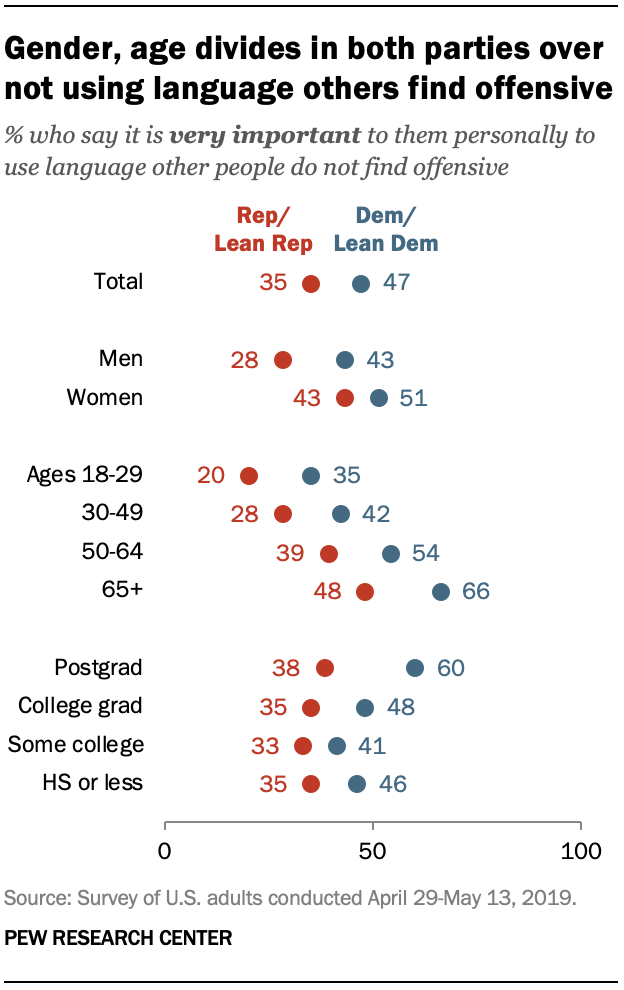 Within both political parties, there is a gender gap over the importance of using inoffensive language. Republican men (28%) are significantly less likely than Republican women (43%) to say it is very important to them personally to use language that is not offensive. And Democratic men (43%) prioritize this less than Democratic women (51%).
Within both political parties, there is a gender gap over the importance of using inoffensive language. Republican men (28%) are significantly less likely than Republican women (43%) to say it is very important to them personally to use language that is not offensive. And Democratic men (43%) prioritize this less than Democratic women (51%).
Younger Republicans and Democrats are both less likely than older adults in their respective parties to say it is very important to use language that other people do not find offensive. The size of the partisan gap is largely consistent across age groups, with Democrats expressing greater concern about this than Republicans.
Among Democrats, those with a postgraduate degree are significantly more likely than those with lower levels of education to say it is very important to them personally to use language other people do not find offensive. By contrast, there are no meaningful differences among Republicans by levels of educational attainment.
Have people changed how they discuss sensitive conversation topics?
When it comes to conversations around subjects like race, gender and religion, a narrow majority (55%) say they have not really changed how they talk about these subjects, while 45% say they are more careful with the language they use now than they used to be.
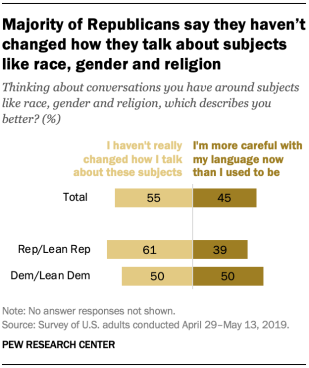 On balance, Republicans are more likely to say they have not really changed how they talk about these subjects (61%) than to say they are now more careful with the language they use (39%).
On balance, Republicans are more likely to say they have not really changed how they talk about these subjects (61%) than to say they are now more careful with the language they use (39%).
By contrast, Democrats are evenly split in their views. Half say they are more careful now than they used to be, while an identical share say they have not really changed how they talk about these subjects.
Younger adults are more likely than older adults to say they are more careful with the language they use to talk about subjects like race, gender and religion than they used to be.
Among adults ages 18 to 29, 52% say they are more careful with the language they use now, compared with 43% of adults ages 30 and older.
While there is no significant gender gap overall, Democratic men are more likely than Democratic women to say they are now more careful with the language they use when they talk about these subjects (54% vs. 46%, respectively). There are no differences between the views of Republican men and women.
Race, education differences in feeling ‘unfairly judged’ for language use
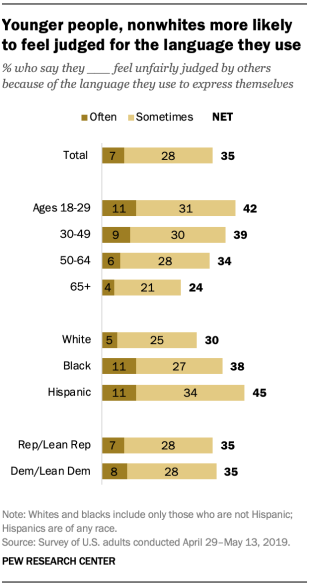 Overall, 35% of adults say they often (7%) or sometimes (28%) feel unfairly judged by others because of the language they use to express themselves. A larger share (64%) say they rarely (38%) or never (25%) feel unfairly judged by others because of how they express themselves.
Overall, 35% of adults say they often (7%) or sometimes (28%) feel unfairly judged by others because of the language they use to express themselves. A larger share (64%) say they rarely (38%) or never (25%) feel unfairly judged by others because of how they express themselves.
While there are differences in these perceptions by age and race, there are no differences based on partisanship.
Roughly four-in-ten of those ages 18 to 29 (42%) and ages 30 to 49 (39%) say they often or sometimes feel unfairly judged by others because of the language they use to express themselves. Among those ages 50 to 64, 34% report feeling this way and just 24% of those 65 and older say they often or sometimes feel unfairly judged by others because of the language they use.
Hispanics (45%) and black people (38%) are significantly more likely than whites (30%) to say they feel unfairly judged by others because of the language they use to express themselves.
Among adults overall, those without a college degree (38%) are more likely than those who have graduated from college (29%) to say they often or sometimes feel unfairly judged by others because of the language they use to express themselves.
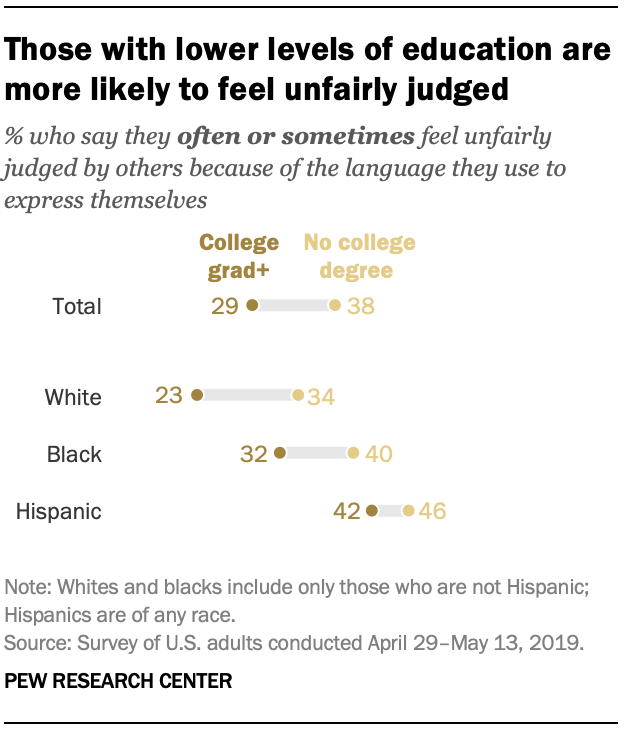 This education pattern is present among both whites and blacks. Among whites, 34% of those without a college degree say they often or sometimes feel unfairly judged because of the language they use to express themselves, compared with 23% of those who have graduated from college.
This education pattern is present among both whites and blacks. Among whites, 34% of those without a college degree say they often or sometimes feel unfairly judged because of the language they use to express themselves, compared with 23% of those who have graduated from college.
Similarly, black adults without a college degree are more likely than those who have graduated from college to say they at least sometimes feel unfairly judged by others because of how they express themselves (40% vs. 32%).
There are no significant differences among Hispanics on this question by level of educational attainment.
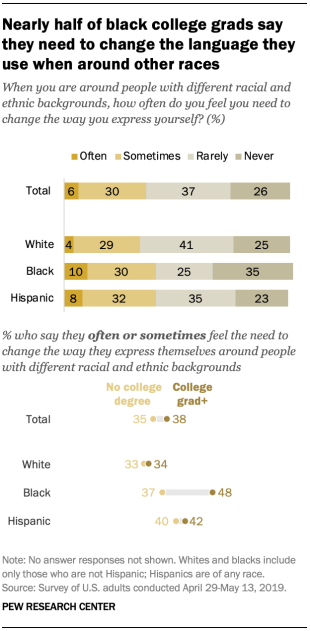 Overall, 36% of adults say that when they are around people with different racial and ethnic backgrounds than their own, they often (6%) or sometimes (30%) feel the need to change the way they express themselves. A majority of the public says they rarely (37%) or never (26%) feel the need to change how they interact with others of different racial backgrounds.
Overall, 36% of adults say that when they are around people with different racial and ethnic backgrounds than their own, they often (6%) or sometimes (30%) feel the need to change the way they express themselves. A majority of the public says they rarely (37%) or never (26%) feel the need to change how they interact with others of different racial backgrounds.
There are significant differences in these views by race and ethnicity. Four-in-ten blacks and Hispanics say they often or sometimes feel the need to change the way they express themselves around people with different racial and ethnic backgrounds than their own; a somewhat smaller share of whites (33%) says the same.
There is little overall difference in these views by level of educational attainment. However, black adults with a college degree are significantly more likely than blacks without a college degree to say they feel the need to change the way they express themselves when they are around those with different racial backgrounds than their own (48% vs. 37%).
This education pattern among black people can also be seen in the share who say they never feel the need to change the way they express themselves around people of different racial and ethnic backgrounds. Overall, 44% of blacks with a high school diploma or less education say they never feel the need to change the way they express themselves around people of different racial and ethnic backgrounds; blacks who have some college experience but no four-year degree (32%), or who have a four-year college or postgraduate degree (20%), are much less likely to say they never have to change the way they express themselves.


 Views about the acceptability of political insults
Views about the acceptability of political insults Across the Table: Would you share your views of Trump over dinner?
Across the Table: Would you share your views of Trump over dinner?